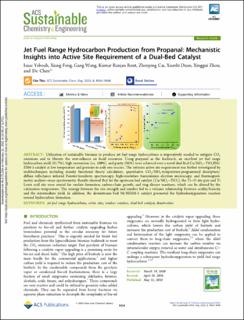Jet fuel range hydrocarbon production from propanal: Mechanistic insights into active site requirement of a dual-bed catalyst
Yeboah, Isaac; Feng, Xiang; Wang, Gang; Rout, Kumar Ranjan; Cai, Zhenping; Duan, Xuezhi; Zhou, Xinggui; Chen, De
Peer reviewed, Journal article
Published version

Åpne
Permanent lenke
https://hdl.handle.net/11250/2727671Utgivelsesdato
2020Metadata
Vis full innførselSamlinger
Originalversjon
ACS Sustainable Chemistry and Engineering. 2020, 8 9434-9446. 10.1021/acssuschemeng.0c02200Sammendrag
Utilization of sustainable biomass to produce jet fuel range hydrocarbons is imperatively needed to mitigate CO2 emissions and to liberate the over-reliance on fossil resources. Using propanal as the feedstock, an excellent jet fuel range hydrocarbon yield (81.7%), high conversion (ca. 100%), and purity (85%) were achieved over a novel dual-bed Cu/SiO2–TiO2||Ni/ZSM-5 catalyst at low temperature and pressure in only one reactor. The intrinsic active site requirement was further investigated by multitechniques including density functional theory calculation, quantitative CO2/NH3-temperature-programmed desorption/diffuse reflectance infrared Fourier-transform spectroscopy, high-resolution transmission electron microscopy, and thermogravimetric analysis–mass spectrometry. Results showed that for the upstream bed catalyst (Cu/SiO2–TiO2), the Ti–O site pair and Ti Lewis acid site were crucial for enolate formation, carbon-chain growth, and ring closure reactions, which can be altered by the calcination temperature. The synergy between the site strength and number led to a volcanic relationship between acidity/basicity and the intermediate yield. In addition, the downstream bed Ni/HZSM-5 catalyst promoted the hydrodeoxygenation reaction toward hydrocarbon formation.
